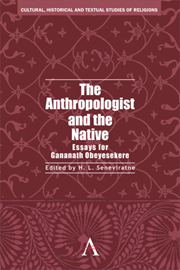Book contents
- Frontmatter
- Contents
- Editor's Note
- The Anthropologist and the Native: Essays for Gananath Obeyesekere
- SECTION I THE INDIAN TRADITION AND ITS REPRESENTATION
- SECTION II CASTE, KINSHIP, LAND AND COMMUNITY
- SECTION III RENUNCIATION AND POWER
- The Morality of Refusal
- Revolt in the Temple: Politics of a Temple Paintings Project in Sri Lanka
- Pain and Power: Reflections on Ascetic Agency
- SECTION IV BUDDHISM TRANSFORMED
- SECTION V THE ENIGMA OF THE TEXT
- SECTION VI THE ANTHROPOLOGIST AND THE NATIVE
- List of Contributors
Pain and Power: Reflections on Ascetic Agency
from SECTION III - RENUNCIATION AND POWER
Published online by Cambridge University Press: 05 May 2012
- Frontmatter
- Contents
- Editor's Note
- The Anthropologist and the Native: Essays for Gananath Obeyesekere
- SECTION I THE INDIAN TRADITION AND ITS REPRESENTATION
- SECTION II CASTE, KINSHIP, LAND AND COMMUNITY
- SECTION III RENUNCIATION AND POWER
- The Morality of Refusal
- Revolt in the Temple: Politics of a Temple Paintings Project in Sri Lanka
- Pain and Power: Reflections on Ascetic Agency
- SECTION IV BUDDHISM TRANSFORMED
- SECTION V THE ENIGMA OF THE TEXT
- SECTION VI THE ANTHROPOLOGIST AND THE NATIVE
- List of Contributors
Summary
Introduction
January 2001 I saw in one of India's English-language newspapers a photograph of an Indian ascetic who had taken a bath in the sacred confluence of Yamuna and Ganges at Allahabad during the Kumbh Mela, a bathing festival occurring once in twelve years and attracting more than 20 million pilgrims. The caption read: “This sadhu has taken his bath at the Kumbh and now he is off again to the Himalayas”. At one level this can be taken to express the essence of asceticism, namely that its proper place is outside of normal society, in a cave in the Himalayas. At another level one can take also this as expressing the normative view of modern, English-reading Indians, namely that ascetics do not belong to modern, secular society and thus should be confined to their Himalayan caves. When these two levels coincide, the modern view with the essentialist one, the historian and anthropologist is alerted to the task of deconstruction. Indeed, how much of asceticism can we understand with our modern frame of mind, our modern conceptual apparatus? But, at the same time, why do we feel the constant need to put asceticism as modernity's ‘other’, as it is nicely captured in English-language Indian newspapers where happenings in the Kumbh Mela and developments in the Information Technology sector vie for attention on the front pages.
- Type
- Chapter
- Information
- The Anthropologist and the NativeEssays for Gananath Obeyesekere, pp. 203 - 218Publisher: Anthem PressPrint publication year: 2011

